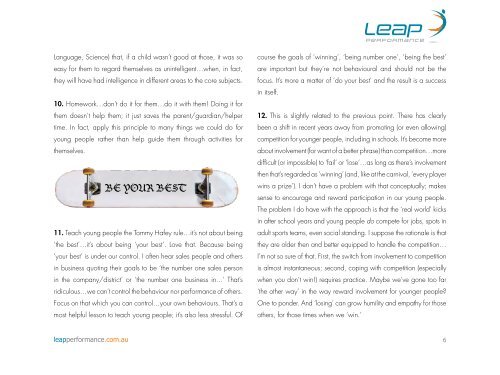Helping-Young-People-Succeed
Helping-Young-People-Succeed
Helping-Young-People-Succeed
Create successful ePaper yourself
Turn your PDF publications into a flip-book with our unique Google optimized e-Paper software.
PERFORMANCE<br />
Language, Science) that, if a child wasn’t good at those, it was so<br />
easy for them to regard themselves as unintelligent…when, in fact,<br />
they will have had intelligence in different areas to the core subjects.<br />
10. Homework…don’t do it for them…do it with them! Doing it for<br />
them doesn’t help them; it just saves the parent/guardian/helper<br />
time. In fact, apply this principle to many things we could do for<br />
young people rather than help guide them through activities for<br />
themselves.<br />
BE your best<br />
11. Teach young people the Tommy Hafey rule…it’s not about being<br />
‘the best’…it’s about being ‘your best’. Love that. Because being<br />
‘your best’ is under our control. I often hear sales people and others<br />
in business quoting their goals to be ‘the number one sales person<br />
in the company/district’ or ‘the number one business in...’ That’s<br />
ridiculous…we can’t control the behaviour nor performance of others.<br />
Focus on that which you can control…your own behaviours. That’s a<br />
most helpful lesson to teach young people; it’s also less stressful. Of<br />
course the goals of ‘winning’, ‘being number one’, ‘being the best’<br />
are important but they’re not behavioural and should not be the<br />
focus. It’s more a matter of ‘do your best’ and the result is a success<br />
in itself.<br />
12. This is slightly related to the previous point. There has clearly<br />
been a shift in recent years away from promoting (or even allowing)<br />
competition for younger people, including in schools. It’s become more<br />
about involvement (for want of a better phrase) than competition…more<br />
difficult (or impossible) to ‘fail’ or ‘lose’…as long as there’s involvement<br />
then that’s regarded as ‘winning’ (and, like at the carnival, ‘every player<br />
wins a prize’). I don’t have a problem with that conceptually; makes<br />
sense to encourage and reward participation in our young people.<br />
The problem I do have with the approach is that the ‘real world’ kicks<br />
in after school years and young people do compete for jobs, spots in<br />
adult sports teams, even social standing. I suppose the rationale is that<br />
they are older then and better equipped to handle the competition…<br />
I’m not so sure of that. First, the switch from involvement to competition<br />
is almost instantaneous; second, coping with competition (especially<br />
when you don’t win!) requires practice. Maybe we’ve gone too far<br />
‘the other way’ in the way reward involvement for younger people<br />
One to ponder. And ‘losing’ can grow humility and empathy for those<br />
others, for those times when we ‘win.’<br />
leapperformance.com.au<br />
6


